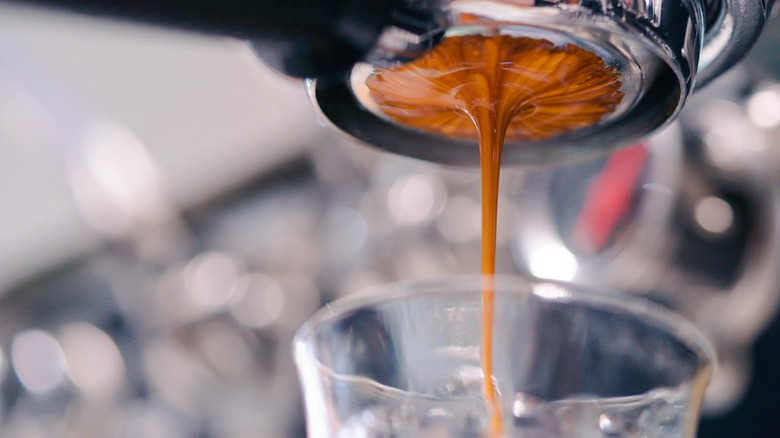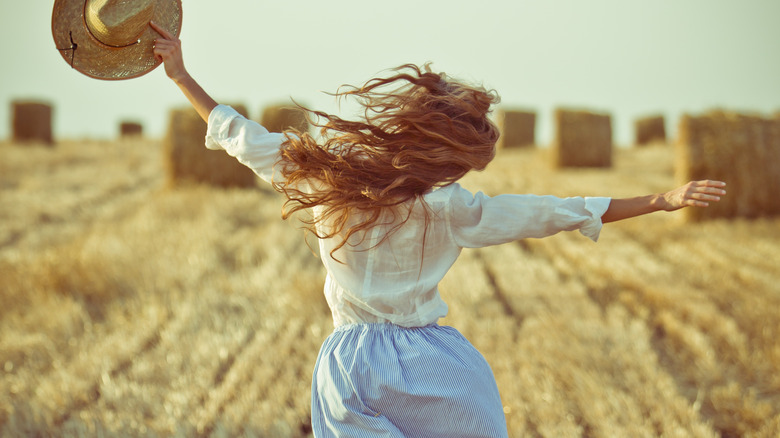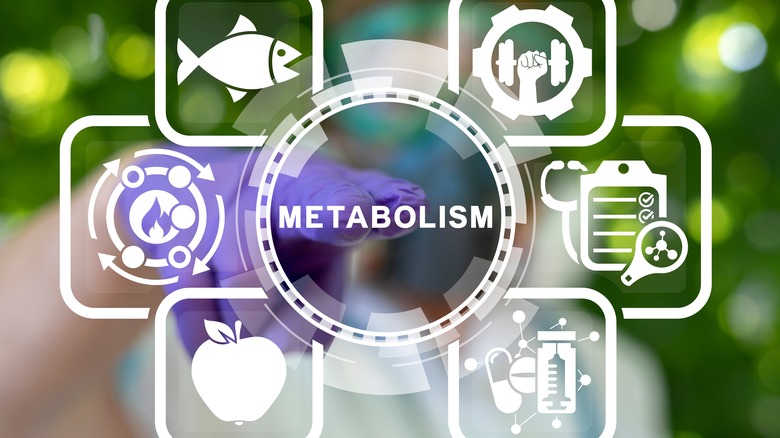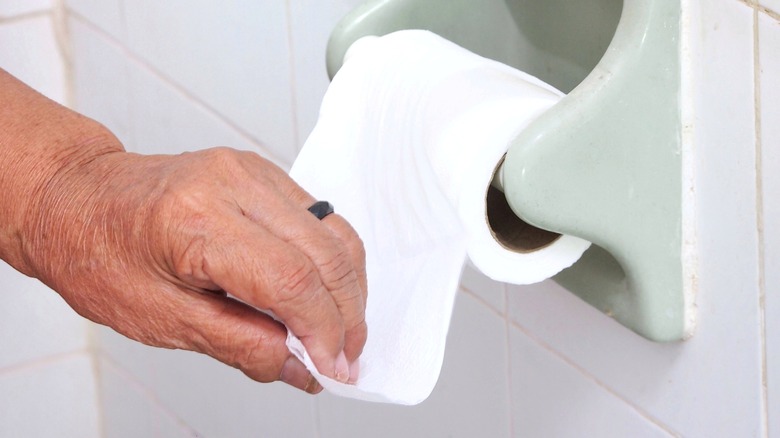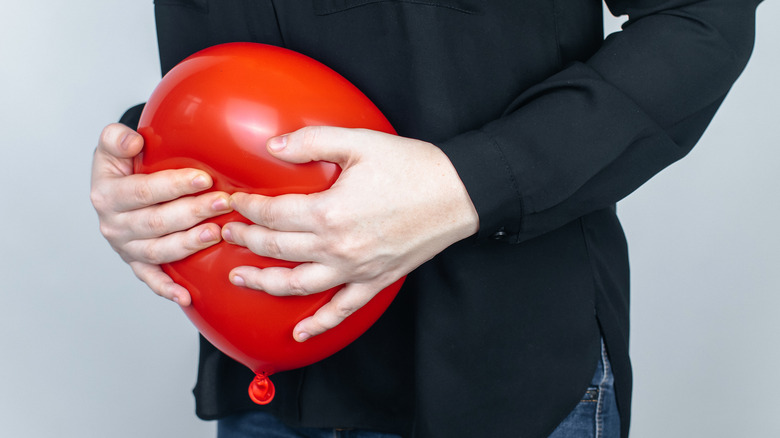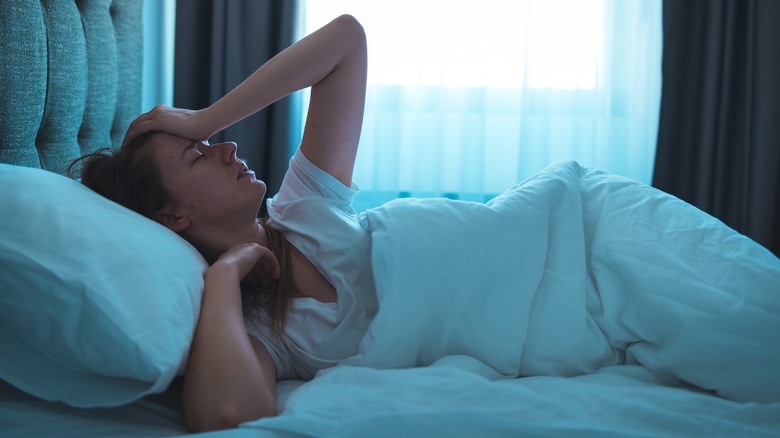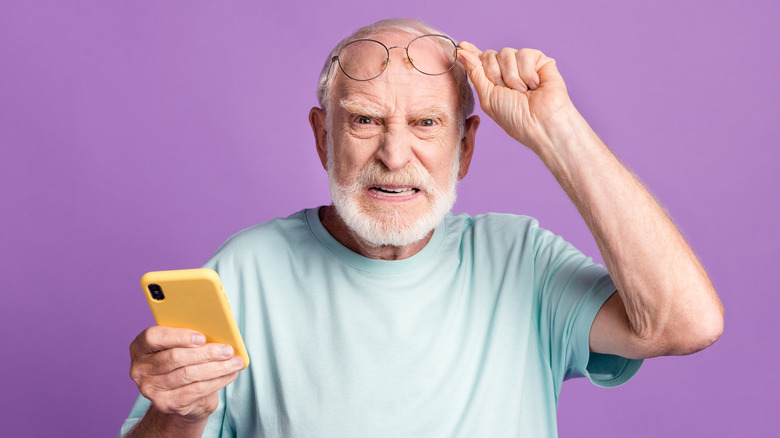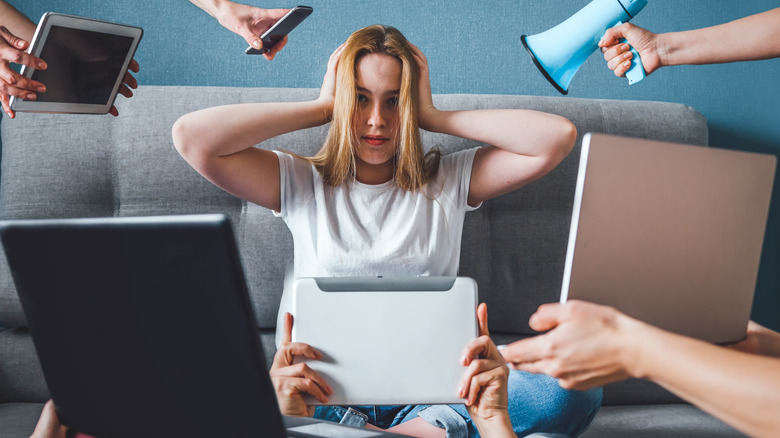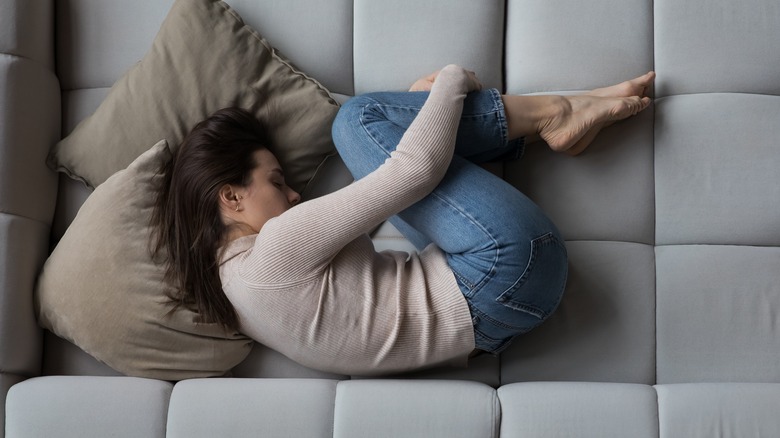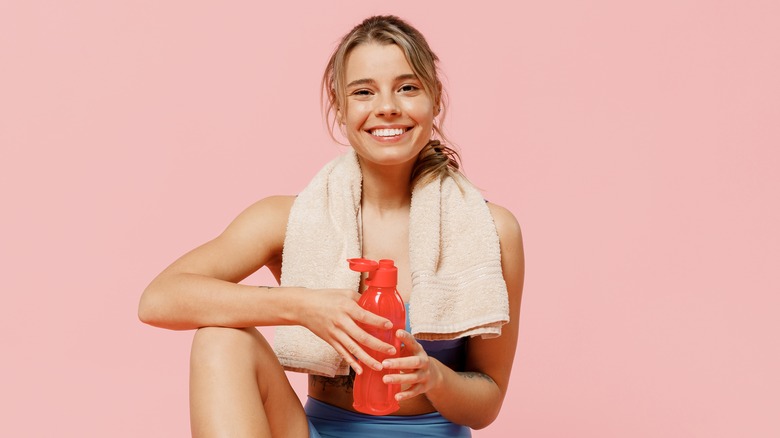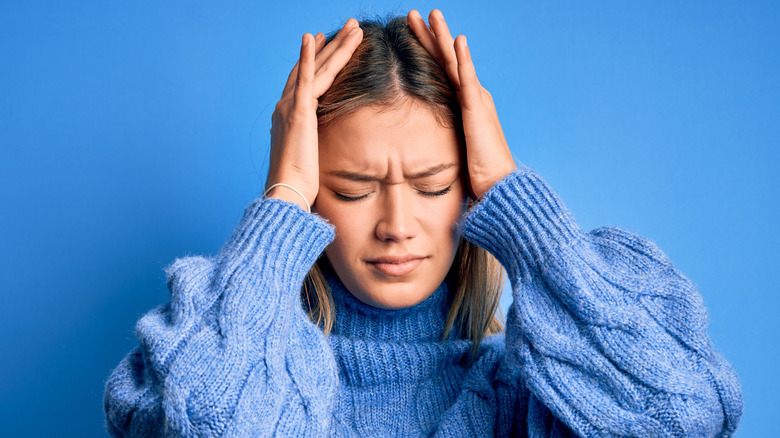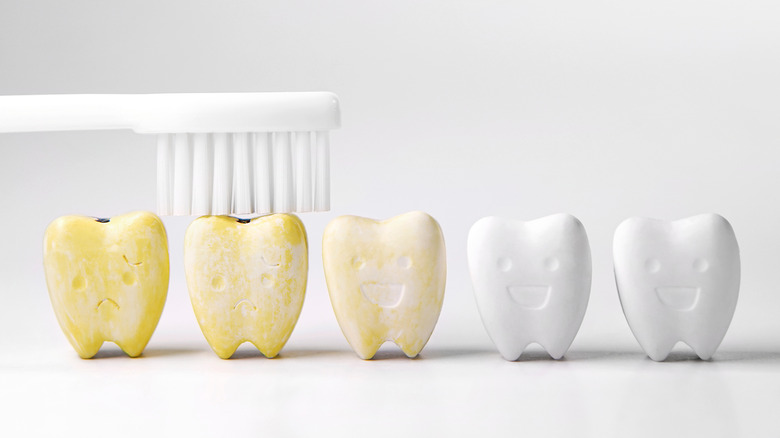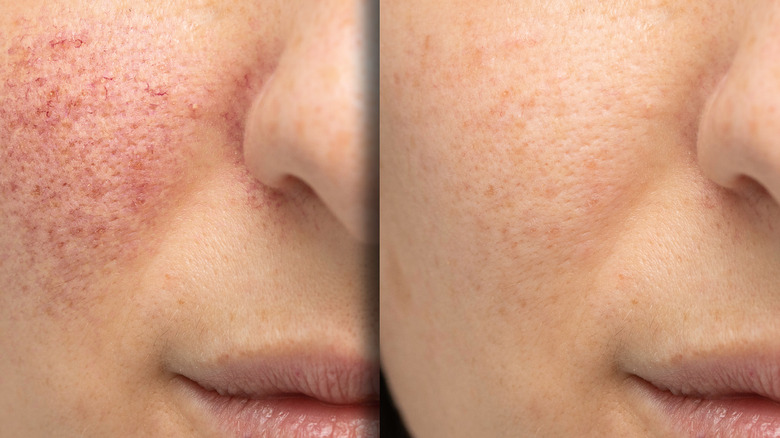What Drinking Espresso Every Day Does To Your Body
People have been starting their day with a cup or two of coffee since forever, but espresso and espresso-based drinks are becoming more and more popular. According to statistics from the National Coffee Association, consumptions of espresso-based drinks such as cappuccinos, lattes, and flat whites has increased by 50% since 2015. These drinks are particularly popular with the 25- to 39-year-old demographic.
Espresso is made from the same beans as regular coffee, but the beans are roasted and brewed differently. Most people prefer a medium to dark roast coffee bean for espresso, as it provides a bold flavor, and the beans are more finely ground (per Coffee Bros. Roastery). While drip coffee is made by dripping hot water over coarsely ground coffee beans, espresso is made by rapidly forcing hot water through a puck of finely ground coffee beans. As a result, espresso is much more concentrated and has a stronger flavor. One mug of coffee uses roughly the same amount of coffee grounds as one shot of espresso. You can enjoy espresso plain or with milk in a cappuccino or café latte.
Espresso affects a wide variety of body functions, from mood to energy level to sleep habits. By understanding what happens to your body when you drink espresso every day, you can make an informed decision about drinking an espresso every morning or during your afternoon break.
You'll have more energy when you drink espresso every day, but there's a catch
Many people rely on a cup of coffee for an energy boost, so it makes sense that a shot of espresso would have the same effect. But does espresso (or coffee, for that matter), really increase your energy level? According to Queensland Health, it does.
Coffee beans contain caffeine, which acts as a mild stimulant when ingested. When you ingest caffeine or other stimulants, your body processes messages between the brain and body more quickly. You should start to feel more awake and alert within 5 to 30 minutes of drinking espresso. Caffeine affects each person differently based on their weight, metabolism, and caffeine tolerance.
And there's the catch: tolerance. People who drink espresso every day build up a tolerance to the caffeine in it. If you drink espresso every day, you might find that your typical shot no longer gives you the boost it once did. It's fine to have a double shot, but make sure not to consume more than 400 milligrams of caffeine each day. That means you can safely have two to three shots of espresso. If you still feel sluggish, you might want to cut back on the caffeine and look at your sleep habits or other health factors that influence your energy levels.
Drinking espresso every day will boost your metabolism
Drinking espresso every day will boost your metabolism, but what does that mean? Metabolism is one of those words that people throw around without fully understanding the term. "She must have a fast metabolism — just look at her eat!" or "I can't seem to lose any weight because my metabolism is so slow." According to the Mayo Clinic, your metabolism is simply the process by which your body utilizes the food and beverages you consume to fuel it.
Even at rest, you need energy to breathe, pump blood through your body, repair cells, and perform many other functions. When active, you need energy to fuel your muscles. Everyone's metabolism is different, but in general, it is determined by your age, gender, body size, and body composition. Muscle mass increases your metabolism, even at rest, so people with bigger muscles have a faster metabolism. We all lose muscle with age, so younger people generally have a faster metabolism than older people.
Drinking caffeine-containing beverages such as espresso and coffee can increase your resting metabolic rate, according to a 1980 study published in the American Journal of Clinical Nutrition. Study participants experienced an increase in resting metabolism and fat oxidation during a three-hour period after consuming coffee or a caffeine supplement.
Expect frequent trips to the bathroom if you drink espresso every day
If you drink any kind of liquid, you can expect to pee. But if you drink espresso, you can expect to head to the bathroom even more frequently. According to the Mayo Clinic, caffeine can increase the amount of urine you produce, although this effect is more pronounced in people who are not used to caffeine. If you drink espresso every day, you might be safe.
Your daily espresso may still make you poop, though (per Health). Caffeine and other espresso components such as chlorogenic acids and melanoidins stimulate your colon, which makes you feel like you need to go. Espresso can also stimulate your body to produce hormones that cause gut contractions, which moves food through your intestines and toward your rectum. Roughly one-third of the population is sensitive to this effect, and women tend to be more sensitive than men.
In some cases, it's not the espresso but what you add to it that makes you run to the toilet. Artificial sweeteners can have a laxative effect on some people (per a 2020 review from the journal Nutrients), so your no-cal sweetener may be to blame. You might also blame the cow's milk in your daily cappuccino or café latte, as people with lactose intolerance may experience diarrhea after consuming milk (per a 2008 review in the journal Alimentary Pharmacology & Therapeutics). If you experience these symptoms, try taking your espresso black for a few days.
Drinking espresso every day may cause bloating
The sudden urge to poop might not be the only abdominal distress you experience if you drink espresso every day. It might also leave you feeling gassy, bloated, and just plain uncomfortable, but maybe not for the reason you'd think. Coffee and espresso have a reputation for causing digestive distress, but that reputation is ill-deserved. The cream and sugar you add to your daily espresso are the more likely culprits.
People often think that because coffee and espresso are acidic, drinking them must increase your stomach's acid content, contributing to conditions like heartburn. But according to a 2022 review in the journal Nutrients, there is no data to back up the claims that coffee-based beverages cause heartburn, gastroesophageal reflux disease, or peptic ulcers. However, there is evidence that the milk in your cappuccino or café latte can upset your stomach. Lactose intolerance can cause bloating (per a 2013 review published in the journal European Review for Medical and Pharmacological Sciences). About 75% of the world's population is lactose-intolerant, so the odds are not in your favor. Try substituting plant-based milk alternatives if dairy upsets your stomach.
If you like your espresso sweet, your sweet tooth might be working against you. According to a 2015 review from the Cochrane Database of Systematic Reviews, some artificial sweeteners can cause bloating and flatulence. A black shot, maybe sweetened with actual sugar, might be the safest bet if your stomach is sensitive.
Drinking espresso every day can disrupt your sleep
While you would never drink a shot of espresso right before bedtime, you might be surprised to learn that drinking espresso every day, even early in the day, can disrupt your sleep. The caffeine in espresso make it hard to fall asleep (per the Sleep Foundation). Caffeine consumption can also affect the quality and duration of sleep, meaning that even once you fall asleep, you might not sleep well.
A 2016 study published in the journal Nutrients found that total caffeine consumption was negatively correlated with time in bed, meaning that as people consumed more caffeine, they spent less time in bed. This study also found that people who were categorized as good sleepers consumed less caffeine than people categorized as poor sleepers. These categories were based on factors such as sleep quality, latency (how long it takes someone to fall asleep), duration, efficiency (percent of time in bed spent sleeping), disturbances, the use of sleep medication, and daytime dysfunction.
If you struggle to fall asleep, stay asleep, or feel sluggish during the day, you might want to take a look at your espresso habit. Cut back or switch to decaf and see if your sleep improves.
You might be irritable if you drink a lot of espresso every day
Since the caffeine in espresso can interfere with your sleep, it is not a shocker that drinking espresso every day can leave you feeling cranky. According to Medical News Today, people who are sleep deprived may not just feel fatigued, but may also experience mood changes and irritability. If you find yourself waking up on the wrong side of the bed more often than not, cut back on your espresso and avoid drinking it and other caffeinated beverages late in the day.
But waking up tired is not the only reason that you might feel irritable if you drink a lot of espresso every day. People who drink espresso every day may become dependent on the caffeine it provides, and anyone who is dependent on caffeine may experience symptoms of withdrawal when that caffeine wears off. Irritability is one symptom of caffeine withdrawal (per SFGate).
Caffeine alone can also make people cranky. Caffeine stimulates your body to release adrenaline, which can put you in fight-or-flight mode (per Forbes). Large doses in particular can lead to rapid, shallow breathing, increased heart rate, and a rise in blood pressure. People in this state often feel anxious, irritable, and prone to exaggerated emotions.
Is your daily espresso habit triggering anxiety?
According to MedlinePlus, anxiety is a reaction to stress that leaves you feeling fearful and uneasy. While many people rely on espresso and other caffeinated beverages to stay awake and alert, they may not realize that it may also make them feel anxious. According to a 2022 study published in the journal General Hospital Psychiatry, caffeine can be anxiogenic, or anxiety-inducing, in healthy adults as well as patients with panic disorder. Patients with panic disorder were more susceptible to its effects.
In this study, the amount of caffeine required to make the subjects feel anxious was the equivalent of five cups of coffee. According to Consumer Reports, one shot of espresso has about half the amount of caffeine found in a cup of coffee, meaning you would have to drink ten shots to get the same effect. Even regular espresso consumers don't drink that many shots at one time. However, some people are more sensitive to the effects of caffeine than others, including people with panic disorder and performance social anxiety disorder (per a 2010 review from the Journal of Alzheimer's Disease). If you struggle with anxiety, be mindful of how much espresso you consume each day and make a note of how it affects your anxiety level.
It's not clear how drinking espresso every day affects depression
Depression is a clinical condition that goes beyond just feeling sad from time to time. People with depression (per the Mayo Clinic) may feel hopeless, worthless, lose interest in everyday activities, struggle to concentrate, think about suicide, and feel inexplicable physical pain, among other symptoms. It is not clear how espresso consumption affects depression. According to Medical News Today, caffeine may increase depression in people with mood disorders, and caffeine withdrawal can trigger symptoms of depression and anxiety. However, these studies do not definitely demonstrate the effects of espresso on existing depressive symptoms.
We may not be sure how espresso affects people who already have depression, but we do know that it can help prevent depression. A 2019 study published in the journal Psychiatry Research studied thousands of adults, looking at their depressive symptoms and caffeine intake. The results show that caffeine consumption protected against depression, perhaps because of its psychostimulant properties. According to a 2016 review published in the journal Psychopharmacology, caffeine is a psychostimulant like cocaine or amphetamine, but it produces a milder affect. It does so by blocking receptors for the neurotransmitter adenosine, which increases dopamine transmission in the brain. Dopamine produces feelings of reward and pleasure in the brain (per the Cleveland Clinic), which may explain how caffeine protects against depression.
Your athletic performance may improve if you drink espresso every day
Espresso can put a little pep in your step, a boost that can translate into improved athletic performance. Research has demonstrated that caffeine ingestion improves performance across a broad range of physical activities, including sprinting, jumping, throwing, muscle endurance, muscular strength, and aerobic endurance (per a 2021 review published in the Journal of the International Society of Sports Medicine). Caffeine provided the most consistent benefits to aerobic endurance, which is important in a variety of sports and athletic activities such as running, swimming, and biking. According to this review, the optimal time to consume caffeine to boost performance is 60 minutes before the activity.
Caffeine may provide other benefits that can improve athletic performance. According to a 2019 review published in the journal Sports Medicine, caffeine can provide a mental boost that improves cognitive ability and skill-based performance, important components of many sports such as football, basketball, tennis, and others.
Caffeine is not the only compound in espresso that can improve athletic performance. Caffeic acid and cafestol, two other chemical components of coffee and espresso, may help with muscle glycogen recovery, or the restoration of sugar to the muscles after exercise. Recovery is a critical part of any training program, so consuming espresso may help with long-term performance. Muscle recovery also depends on sleep, however, and espresso can interfere with sleep, so make sure not to go overboard with the shots of espresso.
Drinking espresso every day can both cause and treat headaches
It sounds weird, but your espresso habit might be both the cause and the cure of your headaches. These effects occur because of the way that the caffeine in espresso affects your brain and the blood flow to your brain.
According to a 2009 study in the journal Human Brain Mapping, chronic caffeine users (which includes anyone who drinks an espresso every day) experience withdrawal symptoms including headache, fatigue, and impaired concentration 12 to 24 hours after they cease caffeine consumption. So if you skip your morning latte, you can expect a headache later in the day, or even the next morning.
Oddly enough, caffeine can also help if you have a headache. According to the Mayo Clinic, headaches can be caused by swelling or tightening in your blood vessels, which increases the blood flow pressure to your nerves. Your nerves then send pain messages to your brain, and now you have a headache. The caffeine in a shot of espresso can cause your blood vessels to restrict, reducing the blood flow, pressure, and pain. The next time you have a headache, try an espresso before reaching for a painkiller. But if you do take an over-the-counter pain reliever, the caffeine will actually increase its efficacy, so feel free to wash down your medicine with an espresso.
Drinking espresso every day can stain and damage your teeth
If you drink espresso at home, you've probably noticed that it can stain a demitasse cup, so it shouldn't be a surprise that espresso can also stain your teeth. According to Healthline, espresso, tea, and wine all contain tannins. Tannins can cause other molecules to stick to your teeth, leaving a yellow stain. Just one cup a day is enough to stain your teeth.
Thankfully, you don't have to give up your daily espresso or surrender to stained teeth. Brushing twice a day, especially with a whitening toothpaste, and seeing your dentist twice a year for a professional cleaning can remove a lot of the stains espresso leaves behind. Just be careful not to brush right after drinking espresso, as it can damage the enamel on your teeth, making them even more susceptible to stains. Wait 30 minutes before brushing.
You can also take steps to prevent staining in the first place. Drinking water after your espresso can rinse out your mouth and eating raw fruits and vegetables can also help. Strawberries and lemons, in particular, provide fibers that naturally clean your teeth.
Your skin may suffer if you drink espresso every day
If you savor your morning espresso, you may be disappointed to learn that drinking espresso every day is not the best thing for your skin. According to Dr. Deborah Wattenberg, a New York City-based dermatologist featured on the Today show, caffeine can prevent you from retaining water, leading your skin to look dried out and prune-ish. Thankfully, you can counteract this effect by drinking extra water.
Other times, it is not the espresso itself but what you add to it that can damage your skin. Adding a lot of sugar to espresso can be aging. According to UnityPoint Health, sugar can actually interact with your DNA to speed up the aging process, leading to dark spots, wrinkles, and increased acne. Dairy consumption can also trigger or exacerbate acne in some people (per Healthline), so if your drink of choice is a cappuccino or café latte, be on the lookout for breakouts.
On the flip side, caffeinated coffee drinks like espresso may actually be protective against rosacea, a common chronic inflammatory skin disease. Rosacea causes blushing, flushing, visible blood vessels, and pus-filled bumps that look like acne (per the Mayo Clinic). A 2018 study from the Journal of the American Medical Association demonstrated that caffeinated coffee, but not decaf, was inversely associated with the risk of being diagnoses with rosacea, meaning that people who drank caffeinated coffee were less likely than other people to be diagnosed with rosacea.

